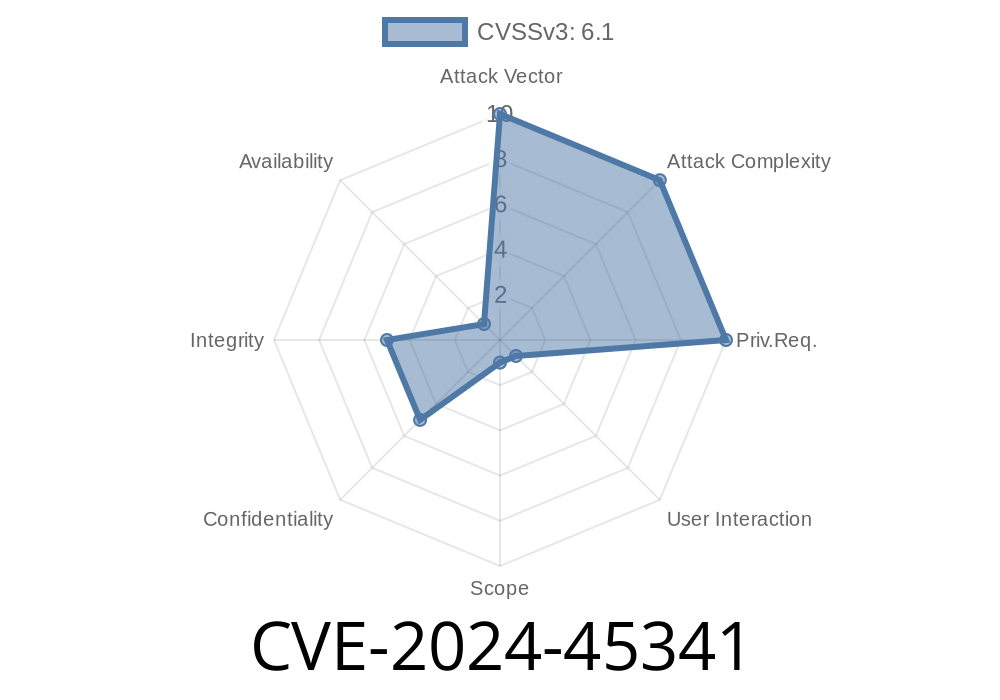The software world cares a lot about authentication and trust, and Public Key Infrastructure (PKI) is the backbone of digital certificates everywhere. Occasionally, vulnerabilities pop up that expose holes not in mainstream web PKI, but in custom, internal, or private PKI setups. CVE-2024-45341 is exactly one of these flaws.
Let’s break down what it is, how it can be exploited, and what you should do if your organization uses private PKIs with certificates carrying URI fields.
Overview: What is CVE-2024-45341?
This vulnerability was disclosed by OpenSSL. Simply put, the bug allows certificates containing a URI with an IPv6 address and a so-called "zone ID" to incorrectly bypass URI name constraints. That means, even if you think you’ve locked down trusted URI namespaces for your certificates, a certificate can sneak past the restriction using a special kind of address.
Who is affected?
Practically, only users of private PKIs that embed Uniform Resource Identifier (URI) fields in their certificates and rely on URI name constraints are impacted. The web PKI (that powers most HTTPS on the internet) does not use URIs like this, so normal web browsing and web servers are not at risk from this specific bug.
Name Constraints: A Quick Refresher
Name constraints are like digital boundary lines. In PKIs, certificate authorities (CAs) can add restrictions that say: “I will only issue certificates valid for certain domains, IP addresses, or URIs.” This helps prevent a CA from being abused to sign certificates for domains or namespaces they shouldn’t touch.
If a certificate’s field (like a URI) falls outside those constraints, it should be rejected. CVE-2024-45341 is all about a loophole in these checks.
The URI uses an IPv6 address _with_ a zone ID: For example,
URI:http://[fe80::1%eth]/some/path
- The PKI enforces URI name constraints: For example, it only allows URIs under a namespace like http://example.com/.
According to the rules, if a URI in a certificate doesn’t conform to the allowed/denied patterns, the certificate should be rejected.
The bug:
The zone ID — the part after the % in [fe80::1%eth] — is not correctly processed during the constraint validation, possibly allowing a forbidden certificate to sneak in.
So a malicious or unintended certificate containing a URI like
http://[fe80::1%eth]/resource
might pass through constraints targeting http://[fe80::1]/, which does not include the zone ID.
Here’s a simplified illustration in Python-style pseudocode, inspired by what a validator might do
def uri_with_zone_id():
allowed_uri = "http://[fe80::1]/"
cert_uri = "http://[fe80::1%eth]/resource"
# Validator strips zone ID or ignores difference
if strip_zone_id(cert_uri) == allowed_uri:
print("Certificate accepted")
else:
print("Certificate rejected")
def strip_zone_id(uri):
# Naive implementation just removes "%zone"
return uri.replace("%eth", "")
uri_with_zone_id()
An insufficient parser might remove or ignore the %eth and treat both URIs as the same — or, in some cases, fail to match constraints correctly, allowing a disallowed certificate through.
How Could This Be Exploited?
1. Attacker or unauthorized user gets a certificate: The cert has a URI SAN (Subject Alternative Name) with an IPv6 address with a zone ID.
2. Private PKI enforces URI name constraints: It checks URIs against a policy, assuming invalid URIs will be rejected.
3. Zone ID in the URI slips past checks: Due to improper handling, the constraint is bypassed, and the certificate is accepted as valid for namespaces it shouldn't be allowed.
This opens the door for spoofing, unauthorized access, or possible privilege escalation inside organizations using private PKIs relying on URI constraints for security.
Real-World Impact
Again: Public web PKI and regular HTTPS are not affected; URIs are not used in that space. This *only* matters for:
Patch & Mitigations
OpenSSL and other PKI handling libraries are updating their name constraint logic to properly check zone IDs.
What should you do?
1. Review your PKI policies: Are you using URI name constraints? Do any issued certificates use IPv6 addresses with zone IDs?
2. Apply updates to cryptographic libraries: Especially if you use OpenSSL for certificate validation in internal applications.
Links & References
- OpenSSL Security Advisory for CVE-2024-45341
- NIST National Vulnerability Database Entry
- OpenSSL Name Constraints Documentation
- RFC 6874: Zone IDs in URIs
Final Word
CVE-2024-45341 is a good reminder that certificate field parsing, especially with corner cases like IPv6 zone IDs, must be airtight. If you rely on custom PKIs, review your usage today. Don’t let a tiny zone ID sneak a bad cert into your trusted chain.
If you found this explanation useful and want more like it, let me know!
*This post was written exclusively for you, breaking down CVE-2024-45341 in plain language. Please refer to the links above for deeper technical details and official advisories.*
Timeline
Published on: 01/28/2025 02:15:29 UTC
Last modified on: 02/21/2025 18:15:17 UTC
